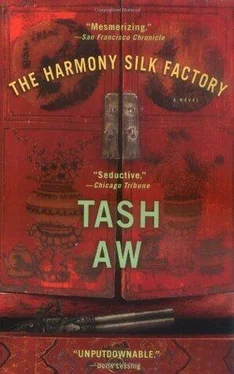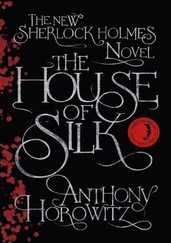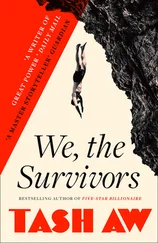The box remained with Johnny for the rest of his life — a symbol of triumph, perhaps, or at least the start of a new life.
The funeral lasted three days, during which the shop remained closed as a mark of respect. On the third day, once the minor ceremonies were over, the final offerings to Tiger’s spirit were made in the middle of Kampar. Anyone who had ever known Tiger was free to attend. A crowd began to gather before the morning became hot. Many people had travelled overnight to attend the occasion, and now stood waiting patiently for their turn before the great, dead man. Even small children queued up to pay their respects. When they approached the coffin they peered nervously at the body. “Pai!” their parents commanded, and so they did, bowing their heads and lowering their burning joss sticks three times.
Little bundles of paper money marked with silver and gold were handed out to all those who came. Each person took this paper money and dropped it into a huge tin drum which held within it a fierce fire, a bonfire of heavenly money for Tiger’s afterlife.
During the days of the funeral Johnny was the focus of attention. He was seen everywhere, organising everything, talking to everyone. Many people remarked how difficult it must have been for him and how well he was coping, but then again they didn’t expect any less. Here was a great man, they said, a pupil in the mould of the teacher, a son in the image of the father.
In the middle of the afternoon, while people waited for the priest (who was late) to arrive, a cloth supplier was seen to approach Johnny. No one heard his exact words, but it became widely known that he asked to speak about business arrangements with Johnny now that Tiger was dead. Perhaps he wanted payment up front; perhaps he wanted to withdraw the shop’s credit for the time being; maybe he even threatened to expose the shop’s Communist links in order to extort larger payments from Johnny. Perhaps he had simply misjudged Johnny’s character, believing that the young man would not be as firm as old Tiger had been. He was wrong. Johnny turned on him with cauldron-black eyes and struck him with a single smooth blow administered with the back of the fist. The man’s entire body spun from the force of the blow and collapsed on the floor. Johnny had his men drag the man out into the dusty road, where he was left to recover in dazed silence, in full view of the scores of mourners. None of them had any sympathy for him, and a few even rounded on him, telling him he should be ashamed at his lack of courtesy. No one was deeply sad when they heard, some months later, of reports from Penang of this man’s death by stabbing in a bar fight in Georgetown.
Johnny arranged for an altar to be built in the shop. White marble framed with carved jade — nothing too showy. A photograph of Tiger was set into the smooth marble face. It was a picture from his younger days, hair waxed and neatly combed, his gentle smile revealing only one gold tooth. An offering to Tiger was laid out before this altar, chrysanthemums and boiled eggs and a poached chicken. An earthenware jar was placed here too, full of burning joss sticks lit by the processing mourners who came to bow to Tiger’s image.
Not a word was said when Johnny took over the Tiger Brand Trading Company, running and controlling every aspect of its business as Tiger had before him. It seemed perfectly natural that this should be the case. In fact, it might be said that the people of the Valley would have been shocked if Johnny had not taken over. There was a new sense of urgency at the shop. Business was as brisk as it ever had been, but both the workers and the customers noticed that there was more energy in the shop now. No one could explain this — it came from Johnny, was their simple explanation. Small things changed too. New lightbulbs were fitted, making the shop less gloomy, so it could stay open later, well after dark. People would call in for a chat on their way to dinner. They would share jokes with Johnny and with one another as he counted up the day’s takings. The light in the shop made everything look golden.
Very soon, people forgot about Tiger. There was no need to remember him now that they had Johnny. They talked, of course, about who might have killed him. The police? Unlikely. They didn’t have enough evidence about Tiger’s “other” activities. A rival businessman? Never. Tiger had no rivals, and besides, without Tiger there would be no business. A rogue bandit? No — remember he had his valuables with him. Most likely it was a traitor, a police informant whom Tiger had taken aside to reprimand. The man (or woman) had panicked and shot Tiger. But some people — generally when drunk — began to say things about Tiger, things no one would have dared to say before. They said maybe he deserved it. He had got fat and lazy and he enjoyed his money just a little bit too much. Sure, he’d done a lot for the Party, but now he was a danger. They weren’t saying that they were happy he was dead, but they weren’t saying they were sad either. He wasn’t the one cycling from village to village keeping the Cause alive in the Valley. He wasn’t the one making money for the shop, money that could buy food and clothes for our boys in the jungle. All Tiger did was tend to his goddam fruit trees. Sometimes he was even seen picking weeds from the grass in his garden, for God’s sake. What a stupid thing for a man like Tiger to do.
Johnny still found time to visit the odd village as he had done before, but his old contacts knew that their boy was now a man, and now they would have to travel to him. A few times a year he organised lectures, which grew less clandestine and more well attended. At these events there was generous hospitality, free food and drink for everyone. There was less lecturing, more laughing. The people loved him. Like us all, they wanted someone to worship and adore, and so they poured their hopes and fears into this young man whom they did not, and never would, truly know.
It was at this point in his life, when he was just becoming a famous man, that Johnny met my mother.
MY MOTHER, SNOW SOONG, was the most beautiful woman in the Valley. Indeed, she was one of the most widely admired women in the country, capable of outshining any in Singapore or Penang or Kuala Lumpur. When she was born the midwives were astonished by the quality of her skin, the clarity and delicate translucence of it. They said that she reminded them of the finest Chinese porcelain. This remark was to be repeated many times throughout her too-brief life. People who met her — peasants and dignitaries alike — were struck by what they saw as a luminescent complexion. A visiting Chinese statesman once famously compared her appearance to a wine cup made for the Emperor Chenghua: flawless, unblemished, and capable of both capturing and radiating the very essence of light. As if to accentuate the qualities of her skin, her hair was a deep and fathomless black, always brushed carefully and, unusually for her time, allowed to grow long and lustrous.
In company she was said to be at once aloof and engaging. Some people felt she was magisterial and cold, others said that to be bathed in the warm wash of her attention was like being reborn into a new world.
She was magical, compelling, and full of love, and I have no memory of her.
She died on the day I was born, her body exhausted by the effort of giving me life. Her death certificate shows that she breathed her last breath a few hours after I breathed my first.
Johnny was not there to witness either of these events.
Her death was recorded simply, with little detail. “Internal haemorrhaging” is given as the official cause. Hospitals then were not run as they are today. Although many newspapers reported the passing of Snow Soong, wife of businessman Johnny Lim and daughter of scholar and tin magnate T. K. Soong, the reports are brief and unaccompanied by fanfare. They state only her age and place of death (twenty-two, Ipoh General Hospital) and the birth of an as yet unnamed son. For someone as prominent as she was, this lack of detail is surprising. The only notable story concerning my birth (or Snow’s death) was that a nurse was dismissed on that day merely for not knowing who my father was. As Father was absent at the time, the poor nurse responsible for filling in my birth certificate had the misfortune to ask (quite reasonably, in my opinion) who the child’s father was. The doctor roared with shock and disgust, amazed at the nurse’s ignorance and rudeness. He could not believe that the nurse did not know the story of Johnny Lim and Snow Soong.
Читать дальше
Конец ознакомительного отрывка
Купить книгу












